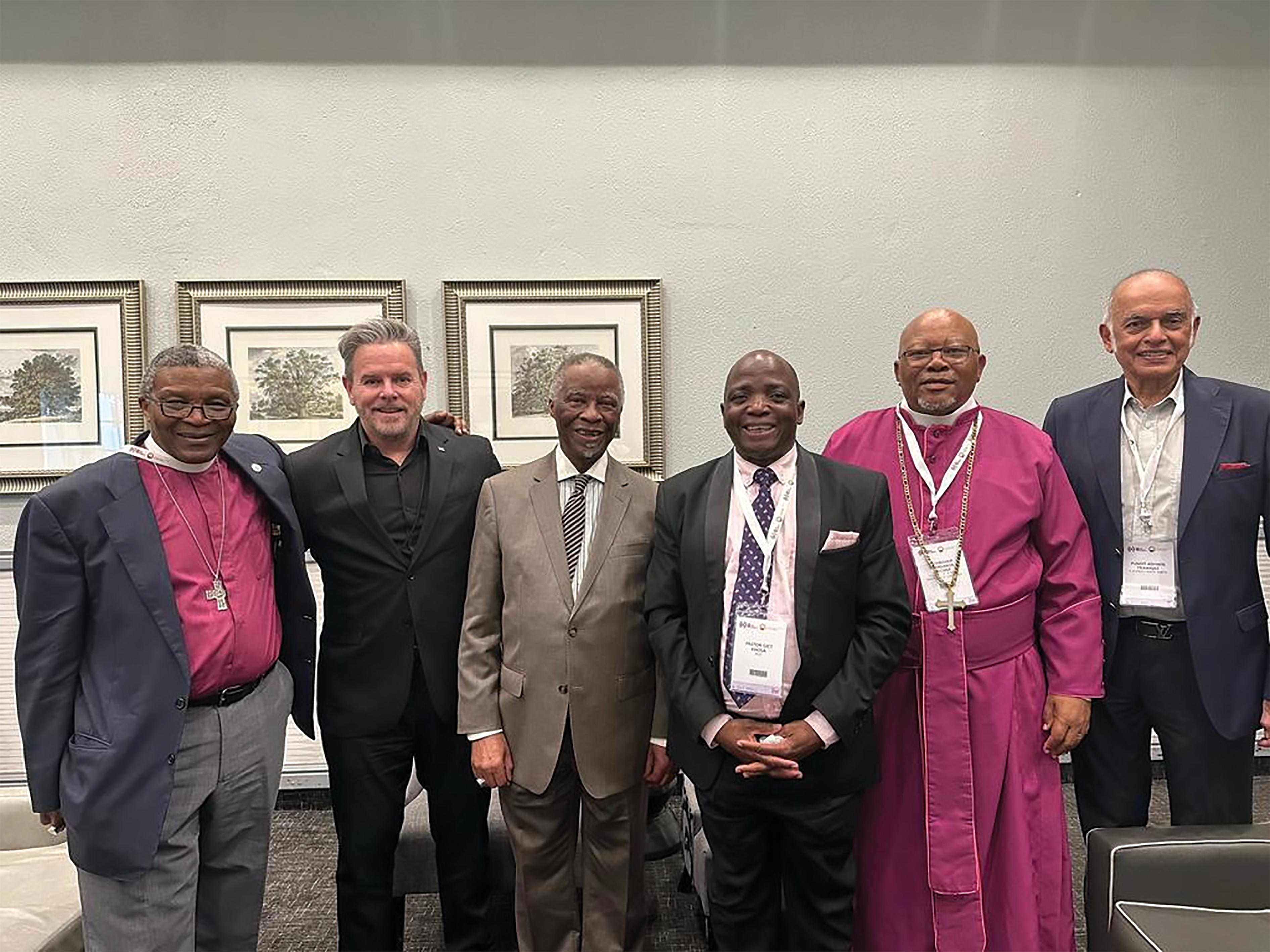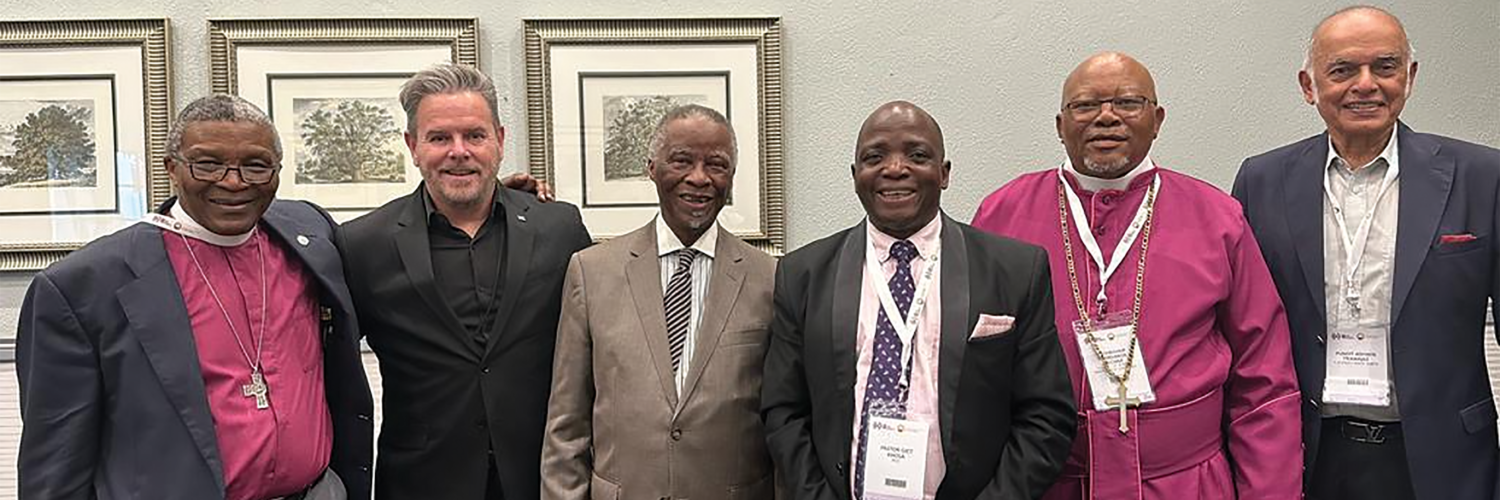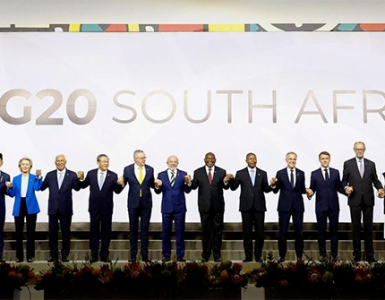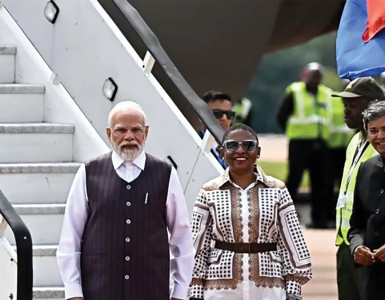FUTURE: The church conference theme – Our Country Our Heritage – was a clarion call to all South Africans to join steering the country in a new direction…
By Sy Makaringe and Nhlanhla Mbatha

Dennis Bloem lumbered into the conference venue clad in a strikingly colourful T-shirt commemorating the 40th anniversary of the United Democratic Front (UDF).
Having just unceremoniously left his beleaguered and moribund political party, COPE, after 15 years as a senior member, the outspoken 69-year-old veteran politician seemed uncharacteristically subdued, appeared lost, lonely and alone – and in need of a political home.
Wearing a UDF T-shirt at such a highly charged event was strategic, given the role the organisation played in intensifying the struggle for liberation in the 1980s and leading up to the unbanning of the ANC in 1990. It sought to heighten Bloem’s waning political currency and affirm his political relevance among people who hardly knew him but know sbouy the UDF’s exploits during the apartheid years from history books.
Bloem was one of the 800+ delegates at this week’s highly charged three-day conference called by The Interfaith Forum of South Africa (TIFSA), an umbrella body representing various faiths and traditions, to give a radical shakeup to what many people label a failing state. His current political wilderness notwithstanding, Bloem went to the conference because it evoked great memories of how the UDF was formed 40 years ago and the promise it held to rip the clutches of apartheid apart.
Just like he did as a 29-year-old on 20 August 1983 when he went to Mitchells Plain, Cape Town, to be part of the historic launch of the UDF by 10 000 people from 575 organisations, Bloem went to the Birchwood Hotel & OR Tambo Conference Centre in Boksburg, Ekurhuleni, to be part of concerned South Africans seeking solutions to the country’s plethora of problems, including corruption, poor governance, rising levels of violent crime, the high rate of unemployment and failure to arrest load shedding.
“The UDF was a grassroots organisation, just as TIFSA is,” said Bloem of a forum made up of disparate and diverse faiths and traditions united by their common frustrations with the worsening socio-political situation in South Africa.
These are SA Council of Churches, Muslim Judicial Council, South African Hindu Maha Sabha, Office of the Chief Rabbi, Council of Muslim Theologians, Nazareth Baptist Church (Ekuphakameni), Nazareth Baptist Church (Ginyezinye), Evangelical Alliance of SA, Council of African Independent Churches, International Fellowship of Christian Churches, among others.
The conference’s theme itself – “Our Country, Our Responsibility” – was a clarion call for all South Africans to begin playing a major role in deciding the direction it should go, and not to leave it only in the hands of politicians. The conference attracted the interest of no less a figure than former president Thabo Mbeki, who, despite his usually hectic schedule found time to spend two full days at the conference (on the first and the last day).
Struggle veteran Father Smangaliso Mkhatshwa, who was nominated a patron of the UDF a month after his five-year banning order expired in July 1983, only to be detained two months later, was in Boksburg, too, to witness what promised to be another UDF moment. The hard-hitting speakers lived up to the billing of the conference’s theme with their bold, brutal and honest appraisal of the current political situation in the country. It was stuff that would boil one with anger.
Dr Sithembele Mbete, a lecturer in the department of political sciences at the University of Pretoria, reminded the participants that the average age of South Africans was 27, implying that the country’s citizens were led by people who did not look – and think – like them. In the same breadth, she was indirectly telling the youth that their inaction or apathy was not doing them any good.
Equally forthright and thought-provoking was Dr Nthabiseng Moleko, a developmental economist and lecturer at the University of Stellenbosch Business School, who said there were six fastest-growing economies in Africa, whose GDPs ranged from the lowest (Rwanda at 7.12%) and the highest (Ethiopia at 9.50%). She asked a pointed question: “Why is South Africa’s economy growing at 0.03%?”
Former statistician general Dr Pali Lehohla observed in his presentation that there were 14 plans and strategies that were crafted between 1994 and now, none of which worked. Bishop Malusi Mpumlwana, general secretary of the SA Council of Churches, made this interesting observation: “The horrific episode of July 2021 shocked many South Africans into denial. ‘This is not us, this is not South African!’ The reality was that this was us, this was the ugly South Africa we had become. It is still our identity as not much has changed in the factors that occasioned that episode.”
All this pointed, in graphic terms, to an incapable state that needs not only shock treatment but a massive overhaul, which was what the participants were vociferous in their articulation. But what happens now that they have ventilated their anger and frustrations over three days at this tranquil conference in the heart of Gauteng? A traditional leader who only identified himself as Induna ET Dlamini of the amaNtungwa Royal Kingdom, said: “This was an extremely good initiative. I hope it wasn’t just a talk shop because in South Africa we have a tendency of talking too much but don’t deliver. The organisers must make sure the outcomes of this conference result in some action,” Dlamini said.
Bloem said unfortunately the conference did not end with the promise it started with.
“At the end of the conference, I expected to see resolutions, not a statement. I expected the country to be placed under a state of emergency. I expected people to be mobilised to march to the Union Buildings,” he said.
The conference’s sub-theme was “From Awareness to Action”. It is a commitment that will either haunt TIFSA or put it in the same league as the UDF or the Congress of the People of 1955.
- The writers are independent journalists.
Comment
BAHULA REMEMBERED AS A GREAT MUSICIAN AND COMPOSER
About 40 000 music lovers who crammed into the Orlando Stadium during the prestigious Castle Lager Jazz Festival on September 26, 1964 cheered and whistled to the unusual sound of a mixture of modern jazz and African traditional music dished out by three young men from Mamelodi, Pretoria who shared the stage with some of the most renowned jazz bands in the country.
Amongst the trio that took the jazz lovers by storm was 26-year-old Julian Bahula who was belting the malombo drums with his open hands while the leader, Phillip Tabane, performed some magic with his guitar and Abbey Cindi was on flute.
The Malombo Jazz Men had arrived in Joburg and for the first time fans were entertained to modern jazz music which was blended with the traditional Sepedi traditional dance and songs that called for an end to racism. Featuring alongside jazz heavyweights who included the legendary drummer, Early Mabuza and his quartet, the Pretoria lads walked away with the first prize.
One of the founder members of that Afro-Jazz trio, Bahula, after spending most of his life in exile because of the apartheid policies of this country, passed on at a Johannesburg private hospital on Sunday after a long illness. South Africa had lost a world renowned music composer and a band leader.
Bahula was also a member of the African National Congress. During his stay in England he had initiated the campaign for the release of Nelson Mandela and had also organized the Free Mandela Concert to coincide with the icon’s 65th birthday.
Bahula is one of many unsung South African musicians who lived many years in exile where their talents were appreciated. It is unfortunate that when they grow older they return to their motherland, almost unheralded and in most cases, at a time when they are ill and with few years to live.
The country’s songbird, Mirriam Makeba and world-renowned trumpeter, Hugh Masekela are just some of the musicians who really made South Africa proud during their times in exile. It is a pity that they could not receive the accolades they had received abroad in their own country.
Born and bred in one of the townships where there was little or no hope of Blacks ever growing to achieve anything, Bahula showed all and sundry that perseverance and hard work were always the best tools to beat all odds.
He did not allow poverty and oppression stand in his way as he strived to become one of the best musicians South Africa had ever produced. His music will live on and reverberate throughout the world. As the saying goes, he might be gone from our sight, but never from our hearts.

































